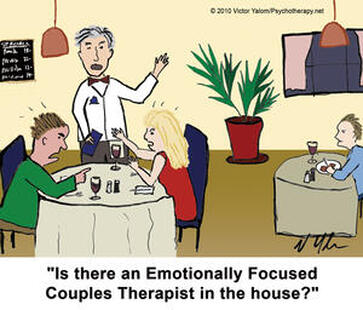
There is this odd idea running around that you have to have it all together before you can be in a "healthy" relationship--that somehow you should be happy with yourself before seeking a partner. Well guess what? None of us has it all together; we are all works in progress. I've heard of mythical creatures that are happy by themselves, zen monks somewhere in the forest in Thailand, but I have yet to encounter any of them.
Look around the human kingdom, or listen to what's playing on the radio; looking for love still hasn't gone out fashion. We're social creatures, and the great majority of us, imperfect as we are, are looking for someone to share our life with.
You don't enter any relationship "baggage free," but the more you understand your own baggage, the more available and empathic you can be with the other. The good news is that in a supportive relationship, you can continue to develop as a person and as a partner. At times I've seen individuals grows more in couples therapy than in their own personal therapy.
Sometimes two people just mesh very nicely, and instinctively are able to help one another grow. But unfortunately, that's not always the case, and oftentimes our own scars or wounds get in the way of us being as loving, compassionate, or understanding as we would like to be. That's where couples therapy can help. It can help each partner see where they are stuck, what they do that hurts rather than helps nurture the relationship, and to change those patterns. It does take two to tango, and in a productive couples therapy, both partners need to work to make things better.
I admit it: I'm a romantic at heart. I get great pleasure seeing couples work together to be more loving, more caring. Things can often turn around, and get on a right course quickly. This is very gratifying when it happens. Of course there are other times when couples therapy helps one or both partners to see more clearly that this relationship just isn't going to work. This can be quite sad to be a part of; lot of tears are often shed, and I grab for the kleenex as well. But tears of joy are often shed when couples learn to really see and hear each other as well.
I try to be as active as necessary to move things along. I encourage partners to talk to each other, not at each other. Easier said than done at times. So I observe closely, watch where things get stuck or derailed. If a husband starts to roll his eyes when the wife starts speaking, or she starts mentally preparing a counter attack as he lays out his laundry list of complaints, then I call an immediate time-out, give explicit feedback on what's not working, and actively coach partners to try something new.
I don't want couples to waste valuable time in the therapy office reenacting destructive arguments; rather I want them to start engaging in positive interactions as soon as possible.
Look around the human kingdom, or listen to what's playing on the radio; looking for love still hasn't gone out fashion. We're social creatures, and the great majority of us, imperfect as we are, are looking for someone to share our life with.
You don't enter any relationship "baggage free," but the more you understand your own baggage, the more available and empathic you can be with the other. The good news is that in a supportive relationship, you can continue to develop as a person and as a partner. At times I've seen individuals grows more in couples therapy than in their own personal therapy.
Sometimes two people just mesh very nicely, and instinctively are able to help one another grow. But unfortunately, that's not always the case, and oftentimes our own scars or wounds get in the way of us being as loving, compassionate, or understanding as we would like to be. That's where couples therapy can help. It can help each partner see where they are stuck, what they do that hurts rather than helps nurture the relationship, and to change those patterns. It does take two to tango, and in a productive couples therapy, both partners need to work to make things better.
I admit it: I'm a romantic at heart. I get great pleasure seeing couples work together to be more loving, more caring. Things can often turn around, and get on a right course quickly. This is very gratifying when it happens. Of course there are other times when couples therapy helps one or both partners to see more clearly that this relationship just isn't going to work. This can be quite sad to be a part of; lot of tears are often shed, and I grab for the kleenex as well. But tears of joy are often shed when couples learn to really see and hear each other as well.
I try to be as active as necessary to move things along. I encourage partners to talk to each other, not at each other. Easier said than done at times. So I observe closely, watch where things get stuck or derailed. If a husband starts to roll his eyes when the wife starts speaking, or she starts mentally preparing a counter attack as he lays out his laundry list of complaints, then I call an immediate time-out, give explicit feedback on what's not working, and actively coach partners to try something new.
I don't want couples to waste valuable time in the therapy office reenacting destructive arguments; rather I want them to start engaging in positive interactions as soon as possible.
